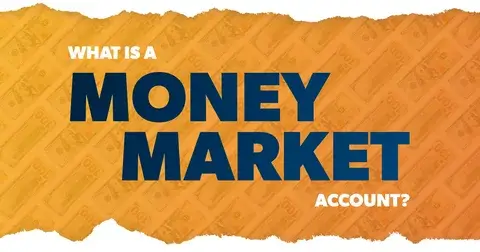Choosing between savings accounts and Money Market Accounts is an important decision that can have a big effect on your financial goals. Both choices have advantages and disadvantages of their own, so it’s important to know the differences between them to choose the one that fits your needs the best. Money market accounts usually have higher interest rates and make it harder to write checks. Savings accounts, on the other hand, give you more freedom and require smaller minimum balances. By looking at the most important differences between money market accounts and savings accounts, you’ll be able to make an informed choice about where to put your money to grow your money the fastest.
What is Money Market Account
A money market account MMA, is a type of savings account that earns interest and is available from banks and credit unions. MMAs are like savings accounts in that they let you keep your money safe while making interest. MMAs, on the other hand, often have higher interest rates and could require a higher minimum amount. They put their money into the short term, low-risk securities like Government bills and commercial paper, which makes them pretty safe. When it comes to cash and making checks, MMAs are good, but they may limit withdrawals and usually charge fees. Overall, Money Market Accounts offer a good mix of safety, access to cash, and the chance to earn higher returns for savers.

What is Savings Accounts
Savings accounts are basic financial tools that banks and credit unions offer to help people safely save money. They usually have low interest rates, which lets savers make money on their accounts without doing anything. Savings accounts are flexible because account users can put money in and take it out whenever they need to. Savings accounts, unlike some stock accounts, are backed by the Federal Deposit Insurance Corporation (FDIC) or the National Credit Union Administration (NCUA). This means that if a bank fails, your money is still safe. Even though savings accounts don’t earn as much interest as some other types of investments, they are still a good way to save for short-term goals and emergencies.
Key Differences Between Money Market Accounts and Savings Accounts
When compared to savings accounts, money market accounts usually have higher interest rates and need a bigger minimum amount. Money market accounts may not let you do as many transactions as savings accounts, which give you more freedom and easy access to your money. Both choices are backed by the FDIC or NCUA, which means that customers’ money is safe.
Interest Rates
The interest rates on money market accounts are usually higher than those on savings accounts. This is because MMAs put their money into short-term, safe investments that could have better returns. On the other hand, savings accounts may have lower interest rates but give depositors more security and access to their money.
Minimum Balance Requirements
When compared to savings accounts, money market accounts usually need a bigger minimum amount to open and keep open. This could be anywhere from a few hundred to a few thousand dollars. Most savings accounts don’t require a minimum amount, which makes them easier for more people to open and use.
Access to Funds
To keep the account’s standing, money market accounts may limit the number of withdrawals you can make each month and the number of checks you can write. Savings accounts usually give you more freedom because you can take out as much money as you want and easily access your money at ATMs, online banking, and in-branch purchases.
FDIC Insurance Coverage
Either the Federal Deposit Insurance Corporation (FDIC) or the National Credit Union Administration (NCUA) will cover your money market account or savings account. This insurance protects savers’ money up to a certain amount per depositor and per type of account ownership in case the bank or credit union fails.
Account Features and Fees
Money market accounts may have extra features like debit cards and the ability to pay bills online. They also have higher account maintenance fees than savings accounts. Savings accounts usually don’t have as many features, but based on the bank and account type, they may have lower fees or none at all.
Pros of Money Market Accounts
When compared to regular savings accounts, money market accounts pay higher interest rates, which means that deposits may earn more money. They also make it easy to get money through checks, debit cards, and electronic transfers, which gives you more options for handling your money. Also, money market accounts usually offer stability and liquidity, which makes them a good choice for buyers who want to be safe.

Higher Interest Rates
Money market accounts usually have higher interest rates than regular savings accounts. This means that savers can possibly make more on their deposits while still having the security and reliability of a bank account.
Easy Access to Funds
A lot of money market accounts make it easy to get your money through checks, debit cards, and electronic transfers. This gives account users a lot of options for managing their money well.
Cons of Money Market Accounts
Even though they have benefits, money market accounts also have problems. A higher minimum amount is often needed to open and keep the account open, which can stop some savers. Some money market accounts may also limit the number of transfers or withdrawals that can be made each month, which could be inconvenient for people who need to access their money often.
Higher requirements for the minimum balance
A bigger minimum balance is often needed to open and keep up a money market account. This can be a problem for savers who don’t have a lot of cash on hand.
Limited Abilities for Transactions
Some money market accounts may limit the number of transfers or withdrawals that can happen each month. This could be a problem for people who need to access their money often.
Pros of Savings Accounts
People who open savings accounts can get their money easily and with little risk. They make it easy to get to your money through a number of methods, such as ATM withdrawals and online trades. Savings accounts are also usually protected by the FDIC or NCUA, which makes sure that the money you put in is safe. With these benefits, savings accounts are a safe way to keep emergency funds and reach immediate spending goals.
Accessibility
Savings accounts make it easy to get to your money through ATM withdrawals, online transfers, and in-person transactions. This makes it easier for account users to keep track of their money.
Low Risk
There isn’t much risk with savings accounts because they are usually guaranteed by the FDIC or NCUA. This means that depositors’ money is safe even if the bank fails. Because of this, they are a safe way to keep cash and emergency funds.
Cons of Savings Accounts
Even though savings accounts have rewards, they also have some problems. They usually have lower interest rates than other types of investments, which means that you might get less money back over time. Some savings accounts may also limit the number of withdrawals or transfers that can be made each month. This can make it harder for account users who need to do a lot of transactions to get to their money.
Lower Interest Rates
Savings accounts usually have lower interest rates than other types of investments like money market accounts or certificates of deposit (CDs). This means that savings may earn less over time.
Limited Liquidity
Some savings accounts may limit the number of withdrawals or transfers that can be made each month. This could make it harder for account users who need to do a lot of transactions to get to their money.
Factors to Consider When Choosing Between Money Market and Savings Accounts
Think about your financial goals, how much risk you are willing to take, and how much cash you need when choosing between money market and savings accounts. Figure out what you think the interest rate will be and compare the account’s features and fees. Knowing about these things will help you pick the account that fits your goals and tastes for investing and saving the most.
Financial Goals
Think about your long-term and short-term cash goals. A savings account might be better if you need quick access to money for situations. A money market account might be a good choice if you want higher returns and a little more time to spend.
Risk Tolerance
Figure out how risky you are willing to be. Money market accounts usually have slightly higher returns, but they can require a higher minimum balance and there is some chance that the market will go down or up. The returns on savings accounts are smaller, but they are more stable.
Liquidity Needs
Think about how often you need to get to your money. Money market accounts may limit transactions to keep the higher interest rate, while savings accounts give you more freedom because you can take money out as often as you want.
Interest Rate Expectations
Think about how interest rates are right now and what you think they will be in the future. Money market accounts usually have interest rates that change based on the market, while savings accounts usually have rates that stay the same.
Account Features and Fees
Check out what each account offers and how much it costs. Some money market accounts have extra features like higher interest rates and the ability to write checks. However, they may also have higher minimum amount requirements and fees compared to savings accounts.
Conclusion
In conclusion, choosing between money market accounts and savings accounts requires careful consideration of several factors. Knowing your financial goals, how much risk you are willing to take, how much cash you need, what interest rate you expect, and the account benefits and fees are very important. By looking at these things, you can make an informed choice that fits your goals and tastes for investing and saving. If you want to read more blog like this then visit our site Cityentreprise










